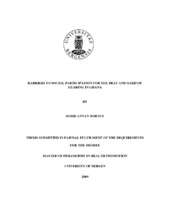| dc.description.abstract | The deaf and hard of hearing are part of marginalised individuals in Ghana who are often relegated to the background and therefore face barriers to participation in society. This lack of participation often leads to the inability to take control over one's own life and health. It also gives rise to feelings of inferiority in several situations. This feelings further leads to lack of self esteem and a perception of low self image which adversely affects the psychological and social health of a person. The Ghanaian society is one in which people have not been socialised to accept differences in terms of disabilities. Therefore, persons with disabilities, particularly the deaf are highly discriminated against. While communication remains the greatest barriers for the deaf, this study found out that there are other barriers to participation as well. The research explored issues of participation within the family, among peers, work colleagues and in other societal settings. It also explored participation issues within education, employment, health care and government sponsorship and delved into policies that impact on the issue of participation for the deaf. The research explored the personal experiences of the deaf and hard of hearing with the aim of identifying factors in the society which militate against their meaningful participation in society. Bronfenbrenner's (1979) ecology of human development theory was used to explain the interactions between the deaf and hard of hearing and their environments and to help identify the barriers faced at the various levels. Results of the research indicate multiple barriers for the Deaf and Hard of Hearing at the different levels of the Ghanaian society. Lack of participation in activities and lack of belongingness were felt by majority of the participants across the different settings of the Ghanaian society. There were impediments along the way in the different transitions the individual makes from the family to school through social life and work life. Participant's recount of their life experiences highlighted areas besides communication in which they face barriers. These areas include education, family and social life, employment, healthcare and access to support for persons with disabilities. There is a disability Act passed in Ghana, however, the positive things expressed in the act that will improve the life of persons with disabilities are yet to be realised. This is reflected in experiences recounted by participants of this research. The problem largely is with the implementation of the policy and enforcement of the law to create enabling conditions for the deaf and hard of hearing. It is evident from the study that to improve participation in daily life activities and to enable them gain control over their life and health, the deaf and hard of hearing need to be included in all societal activities. Quality of education and education in accessible formats should be made available to them to improve their chances of gaining employment and thereby increasing their standards of living and quality of life. | en_US |
